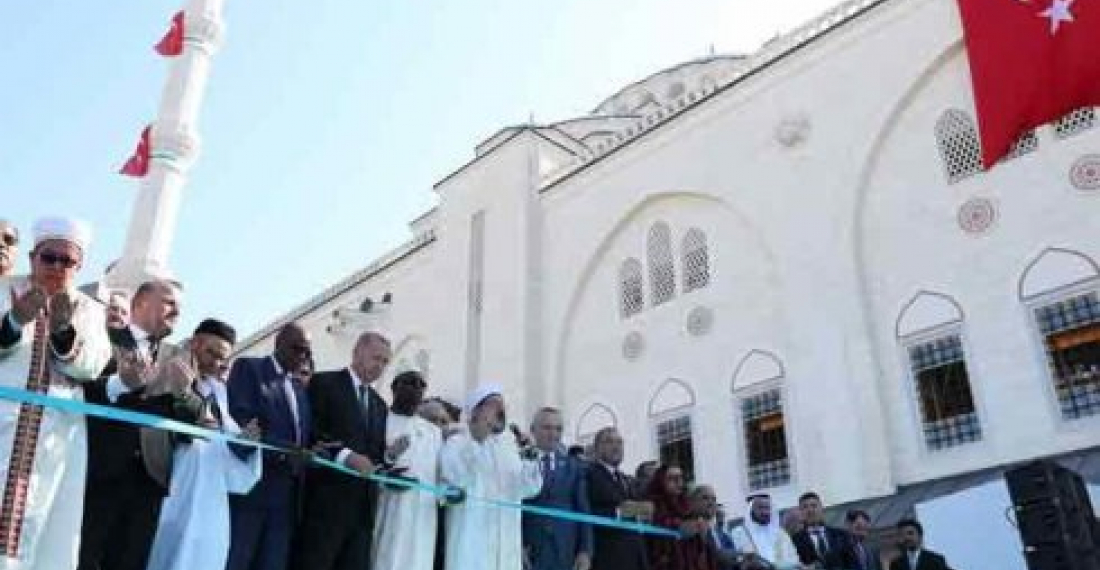Turkish president, Recip Tayip Erdogan, on Friday (3 May) officially inaugurated Turkley's largest Mosque complex, situated on the Asian side of the city of Istanbul.The mosque has the capacity to accommodate 63,000 people at the same time. Situated on Istanbul's Camlica Hill in the Asian side of the city the Mosque is built in the Ottoman-Seljuk style of architecture, and can be easily viewed from every corner of the city.
The Mosque complex includes a museum of Turkish Islamic art, a library, an art gallery, a conference hall, workshops as well as a car park with a 3,500-car capacity.
It has six minarets representing the six beliefs of Islam. Four minarets are 107.1 meters tall, a tribute to the 1071 Manzikert victory of the Seljuk Turks against the Byzantine army that opened up Anatolia for Turkish domination.
Its 72-meter-high main dome represents 72 nations living in the city. The second dome with a diameter of 34 meters represents the car license plate number of Istanbul.
There are 16 names of Allah inscribed inside the dome, symbolizing the number of states founded by Turks.
A three-piece finial on the main dome, weighing 4.5 tons and at a height of 7.77 meters is the largest of its kind.
A 17,000-square-meter carpet rolled out at the mosque is a specially designed hand-knotted carpet. The minbar of the mosque, a pulpit from which sermons of Friday and religious festivals are delivered, is 21 meters high and can be reached by elevator.
In a powerful speech during the inauguration, President Erdogan slammed those who attack innocent civilians in the name of jihad. Attacking innocent worshippers is terror and murder, not jihad, the president said
"No one can attack the places of worship on the grounds of jihad. The massacre of innocents is not jihad but terror, brutality and murder," he said.
The president recalled the recent killings in New Zealand and in Sri Lanka and called for a principled stance on all terrorist attacks. "The terrorist attacks in Sri Lanka with the massacre in New Zealand once again revealed the size of the threat. No one has the luxury to use ‘but' words in the face of terror," the president stated. "After that, no state can make a good or bad distinction among terrorists. A more principled, consistent, clear attitude towards terrorist organizations is now required," he said.
"The perpetrators of these attacks on both mosques and churches have the same mindset," he said. Turkey will continue to fight against neo-Nazi terror, Erdoğan said, suggesting that "even some western countries show a double standard on this issue."
In his speech president Erdogan hailed the construction of the new mosque. "The mosque will add beauty to Istanbul ... We are proud of this work," Erdoğan said addressing attendees at the ceremony.
The ceremony was attended by Albanian President Ilir Meta, President of Guinea Alpha Conde, President of Senegal Macky Sall, Palestinian Prime Minister Mohammad Ibrahim Ishtiyya, President of the Executive Committee of Afghanistan Abdullah Abdullah, Azerbaijani Parliament Speaker Oktay Esadov, Bosnia-Herzegovina Presidency Council Member Sefik Jafarovic, Bosnia and Herzegovina Peoples Assembly President Bakir Izetbegovic, Libyan Parliament Speaker Halid Elmeshri and Tunisia Al Nahda Movement Leader Rashid al-Ghannouchi.
source: commonspace.eu with agencies
photo: Turkish president Recip Tayip Erdogan inaugurating the new Camlika Mosque in Istanbul on 3 May 2019 (picture courtesy of Anadolu News Agency, Ankara)






